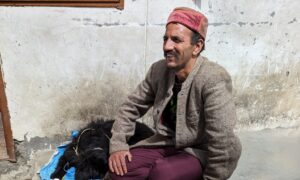It started as a linguistic curiosity, and ended as a lesson in perspectives, with some history and sociology thrown in.
But it really started when I was looking for a postcard.
It was the mid 1990s, and I was walking out of the Old City of Jerusalem, which is perhaps the most contested real estate in the world. Behind me was the Arab shuk, or market, where merchants hock wares of every sort. In front of me was the Jaffa Gate, leading to the New City of Jerusalem.
Jaffa Gate is one of eight gates in the walled Old City. There’s also a “new gate” built in 1889, and six others, which, like Jaffa Gate, were constructed along with the walls themselves in the 1500s by order of the Ottoman Empire’s Suleiman the Magnificent. Before that the Turk Mamluks ruled Jerusalem, and, before them, the Kuridsh Ayyubids. The Ayyubids, under the leadership of Saladin, expelled the Crusaders in 1187, who in 1099 captured Jerusalem from the Muslims, who in 638 took over from the Romans and Byzantines, who in the year 70 razed ancient Jerusalem and exiled the Jews, who had lived there for over a thousand years.
That’s where I was. And I was looking for a postcard to send to my niece.
In the few hundred feet between the Arab market and Jaffa Gate is a combined pedestrian/traffic square of sorts, and one particularly handsome building on the left as you enter houses a handful of falafel and tourist shops. It was outside one of these that I found a postcard rack.

I stopped to browse, chatting with the man in his 40s who was selling the cards. I used English, even though I speak Hebrew just as well, and even though both were probably second languages to him. At one point he turned his attention to another potential customer, who, it turned out, spoke Russian. It further turned out that the merchant also spoke Russian, well enough even to do math in the language.
“You speak Russian?” I asked him in Russian.
“Nemnoga.” A little.
He was old enough that he had almost certainly learned the language as an adult. And I know from my own linguistic training that it’s nearly impossible for most adults to master a new language well enough to use it for math.
“What else do you speak?” I asked, returning to English.
“Well,” he said, “Arabic, obviously. And Hebrew and English. And Spanish and French and Italian. And some Greek. And a little Chinese and Japanese.”
“Wow,” I said.
“I have to make a sale,” he added.
I nodded.
Eventually I selected a postcard and, as I was paying, glanced inside the shop and saw an older gentleman sitting toward the back.
“Is that your father?” I asked.
“Yes,” he said.
I thought it might be nice to praise the son to his father, so, after I paid, I walked into the shop and turned my attention to the older man.
“That’s your son?” I asked him.
He nodded, apparently less at ease with English than his son, but still able to understand.
“He’s very impressive. Speaks a lot of languages.”
“Thank you,” he said, smiling a little.
He asked where I was from and I told him. He spoke quietly in the manner of a man at peace with the world.
After a few more words the man offered me tea. I not a huge fan, but I accepted, eager to continue the conversation.
“Shukran,” I said in Arabic. Thank you.
He replied with something I didn’t understand, presumably some form of “you’re welcome.”
Then over tea I got to wondering: How does a man come to run a tourist shop in this fiercely disputed historic neighborhood? So I started asking:
“Is this your shop?” I asked.
“Yes,” the man said.
“You own it?”
“I own it.”
“You’re the actual owner?”
“Yes.”
“You live in Jerusalem?”
“Yes.”
“Your family is from Jerusalem?”
“Yes. From Jerusalem.”
“How long has your family lived in Jerusalem?”
“Since Saladin,” he said.
Saladin? Since Saladin? His family had lived in Jerusalem since the Muslim Ayyubids had expelled the Christian Crusaders and recaptured Jerusalem 800 years earlier. Well, I thought as we sipped tea: No wonder he doesn’t give a damn what the UN decided in 1948, when that body created the modern State of Israel for the Jews.
From his point of view, I imagine, I was little different from the Crusaders — a temporary occupier of the Muslim Holy City who, just as others had, would in the due course of time likewise be expelled.
He was pleasant, gracious, even. He displayed no animosity. We spoke as friends. And yet we were on opposite sides of a matter of great importance to us both. (Years later I would encounter the exact same dynamic in a very different context with a limo driver in Texas.) That’s the first lesson. People who disagree don’t have to be disagreeable.
The second lesson seems more important to me.
I of course don’t know whether this man’s family actually lived in Jerusalem in 1187, though it’s certainly possible. He himself probably doesn’t know for sure. But he believes he does. And he believes Jerusalem in his.
And that, it seems to me, has to be the beginning of any conversation. That is the role of “narrative.”
At this point I suspect I will be misunderstood, so to be clear: I do not think facts are relative and I am not saying that everyone is entitled to their own history. What I am saying is that, in addition to historical facts, there are interpersonal facts. Different things are important to different people.
So without in any way justifying or agreeing with this man’s position, I have to accept that it is his position. This is a principled decision on my part, because I am beholden to truth. And it’s a pragmatic decision, because otherwise conversation with him will be impossible, just as impossible as it would be if he refused to acknowledge the role of history in my own life.
In this context, I can understand how it might be hard for this man. I understand how recognizing Israel could seem like a betrayal of his hero Saladin. (For that matter, I am obviously no fan of the Crusaders, and I too am grateful for Saladin’s role in evicting them.)
Once I separate the truth of his feelings from the truth of history, I am better able to accept how he feels, because I don’t also have to accept his history.
Unfortunately, my experience has been that two other positions dominate conversation: Either he is entitled to his own history (I disagree) or he is not entitled to his own feelings (again I disagree).
Or to look at it differently, a common frame of reference is as important to conversation as is a common language.
Which fittingly brings us back to this man’s son, who learned almost a dozen languages.
Imagine the doors that might be open to us if we learned a dozen points of view.











